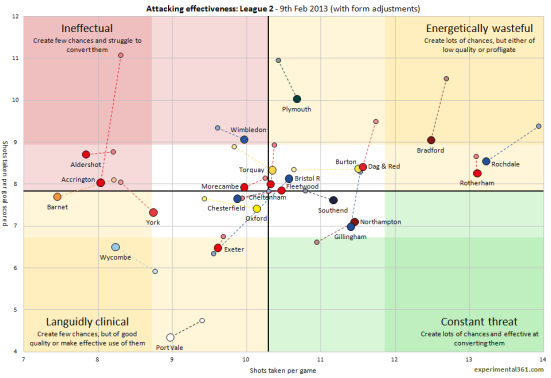One
factor that has been frequently remarked upon this season is the considerable difference between Oxford's home and away form. Saturday's miserable
1-0 defeat to Chesterfield was our seventh at the Kassam Stadium
this season, meaning we have taken just 29 points from a possible 60
at home – less than half. In direct contrast, our form away from
home would put us in the top seven in the league with as many
victories on the road as we have mustered at home all season.
Many
supporters have been quick to blame the condition of the pitch (and
the presence of London Welsh) for our poor home form, and this
certainly hasn't helped. Others have blamed the toxic atmosphere in
the stands for destroying the team's confidence. But this problem is
not a new one, it's been an ever-present thorn in our side for the
last three seasons and is representative of a more fundamental
failing which has never been addressed.
Way
back in September
2011 I wrote about this very same issue, arguing that the reason
we were performing better away from home was because “the onus to
attack is on the home team, and as they attempt to venture forward
the game becomes more open”. This works away from home because our
style of play has always benefited from an open game, but at home we
are often facing sides who come looking to knick a goal and then see
the game out. Chesterfield were a classic example, scoring with their
only chance after five minutes and then looking to slow the game down
and frustrate as they sought to cling onto their lead.
And
the Chesterfield example is not a one-off, we've seen this happen
countless times in recent seasons. Take for example our first home
game in League Two back in August 2010. We thoroughly outplayed a
Bury side who went on to win promotion at the end of the season –
yet somehow finished that game on the losing side. The reception the
team got after that match was overwhelmingly positive because
although we had lost we knew we had been by far the better side and
that could only spell good things for the rest of the campaign. But
that feel-good factor soon wore off after repeat performances against
Stockport, Aldershot, Torquay, Gillingham, Southend and Hereford.
Last season it was the same story, as we dropped points at home to
Aldershot, Burton, Bradford, Crawley, Crewe,
Hereford and Macclesfield – despite being the better side in every
one of those games.
The
problem which hasn't been solved here is the age-old issue of how to
beat sides who turn up and 'park the bus' and it is a problem which,
in three years of trying, Chris Wilder has been unable to solve at
League Two level. The sides which win promotion aren't vastly better
than us in footballing terms; the key difference between them and us
is that they have found a way to grind out results against these
sides. The unfortunate fact is that any mediocre League Two side can
pass the ball around nicely enough on their day – we're certainly
not the only fans who have proclaimed their side 'the best
footballing side in League Two' only to come unstuck in matches we
should be winning. The true key to success at any level is being
clinical when chances are created.
 |
| Picture from Experimental 3-6-1 |
Unfortunately,
these issues have never been addressed, despite being painfully
apparent for quite some time, and it now seems obvious that they
won't be addressed as long as Chris Wilder is the manager. This isn't
a call for his head, but simply a statement of what appear to be the
facts. Speculation has been rife for quite some time that Wilder will
be replaced as manager in the summer, but whoever is in charge next season needs
to look at this as their first priority. Find ways to beat defensive
sides at home and be more clinical in front of goal.
Of course, that is just my opinion. Here are a range of other
opinions of why Oxford have struggled at home this season.
@tbfuth bad pitch, bad atmosphere, pressure from fans, trying too hard to get result.
— richard hanna (@oufc_turkish) March 18, 2013
@tbfuth pitch, lack of 4th stand, atmosphere and most significantly a lack ambition to take the game to the opposition. "Attack" x 5!
— Simon Lill (@OUFC1976) March 18, 2013
@tbfuth Inability to break open teams who sit back. We can bang with the big boys but get hustled by lesser teams.
— Gareth Brown (@OXONAssassin) March 18, 2013
@tbfuth basically we play same home or away difference being teams that attack us we tend to beat cos of the way we are set up 1/2
— Andrew Bedding (@billyoufc) March 18, 2013
@tbfuth a lack of width at home both wingers need to be told to stay out wide and don't move more than 5 yards inside.
— Andrew Bedding (@billyoufc) March 18, 2013
"@tbfuth: So #oufc fans, why do you think we are so poor at home?" odd how many teams are better away than hone this season across leagues.
— mincheryfarmweb (@MincheryFarmWeb) March 18, 2013
What's you opinion? Leave a comment!









0 comments:
Post a Comment